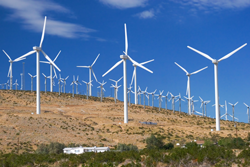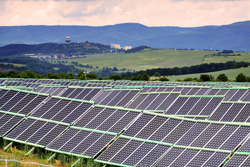The United Kingdom (UK) could see homes being powered by African solar energy as soon as 2018, according to reports by BBC.
The TuNur project, founded in 2011, aims to link Europe to the Sahara Desert through energy exports, as per the TuNur website.
While investors are only in the early stages of negotiation with the UK government, questions arise about feasibility of this project, and whether it will set the trend for the future of renewable energy.
Alan Steinberg, an adjunct professor of political science, said, “I think renewable energy is the way of the future. As the demand for renewable energy grows we should see an increase in its production.” Steinberg however, noted that new discoveries of natural gas, such as those in the Leviathan gas field off the coast fo Israel may complicate the solar export business.
“Renewable energy is very expensive. Although it is a clean source of energy, nuclear energy is much more efficient than solar and wind.” He continued, “Keep in mind that solar and wind also take up much more land than nuclear plants as well.”
Specifically, Steinberg noted that the average wind farm “requires as much as 10 to 80 acres per megawatt of electricity generated.”
In comparison to a nuclear power plant, which “…can be built on a 1,000-acre tract of land,” a “…solar energy plant with comparable generation capability would require 80 square miles – or 51,200 acres – and a comparable wind farm would require 200 square miles,” according to Steinberg.
Dr. Julius Adekunle, a professor of history and anthropology specializing in African studies, said that the transition towards solar power might not be as smooth as expected.
He said, “The complication I can foresee is the ability of African producing countries to come up with quality production that will meet the needs in UK or elsewhere. The quality and ability to meet the demands from consuming countries will drive the competition for the importation of African solar.”
Adekunle noted, however, that the benefits to African nations is apparent. The industrialization required to make the TuNur project possible would create jobs as well as improve the standard of living.
 Adekunle said that solar exports overtaking natural gas exports is reliant upon the “…quality and quantity of production.”
Adekunle said that solar exports overtaking natural gas exports is reliant upon the “…quality and quantity of production.”
“Here in the US, [solar and natural gas] are still used, and solar has not been able to completely displace natural energy. In Africa, it may take a longer time since Africans are just gradually getting into the culture of using solar energy,” Adekunle said.
With 2018 as the goal for implementing this plan, one of the biggest questions is whether projects like these can lessen the global usage of fossil fuels.
Zak Fama, a sophomore history and political science major said, “This is an excellent opportunity for both the UK and the continent of Africa. The TuNur Project aims to build in the Tunisian desert, so the construction will not be impacting a large settlement of people.”
He continued “In exchange for cheap solar energy to the UK, some of these African nations will be opening the door to possible investment in the event that this project is a success.”
Fama questions the possibility of the US using a similar method to import renewable energy. “Since 2010, Transcanada, a Canadian oil giant has been working with the US State Department to finalize the construction of the Keystone XL. This is a new pipeline that aims to bring very dirty and expensive tarsands” oil from Canada into the US.”
Fama said that the US dependence on oil and natural gas causes a “high risk” to the environment due to the “volatility of the crude oil itself.” He reasoned, “If one of the pipes were to burst, the consequences most likely would be comparable to the BP oil spill in 2010.”
A complete transition to solar power appears to be long off, as Steinberg acknowledged the necessity to “maintain a backup source of energy.”
“You can’t change the entire energy game,” said Steinberg on the possibility of the US importing solar. “Even if you have the technology and the equipment, you will always need a backup particularly in the case of solar and wind.”
IMAGES COMPILED by Brandon Johnson



